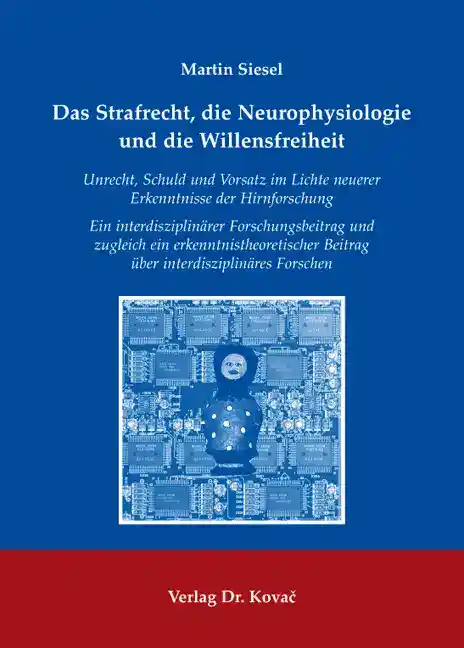Martin SieselDas Strafrecht, die Neurophysiologie und die Willensfreiheit
Unrecht, Schuld und Vorsatz im Lichte neuerer Erkenntnisse der Hirnforschung Ein interdisziplinärer Forschungsbeitrag und zugleich ein erkenntnistheoretischer Beitrag über interdisziplinäres Forschen
Strafrecht in Forschung und Praxis, volume 157
Hamburg 2009, 328 pages
ISBN 978-3-8300-4534-2 (print) |ISBN 978-3-339-04534-8 (eBook)
About this book deutschenglish
Freedom of Will – Neurophysiology – Penal law and CulpabilityThe knowledge of actual brain research, stating, that mental activities are reducible to procedures of processing neuronal signals, may be interpreted, as if man is only free in formatting, yet not in exercising his will. Though, this knowledge does not suggest to abandon penal law of the Federal Republic of Germany, that embodies a law implementing the connecting ideas of act and culpability and thus implies to blame on the perpetrator for not-having-formed-another-will, in favour of a prevention-law inclined to prognostic statements about the potential dangeressness of an actor. Contrary to recently arisen opinion, cherishing to current penal law can not be justified with foundation on a reproach that is dispensed from anticipatory affirmation of freedom of will. Rightly every manner and matter of legal responsability, that is stuck to fulfilled act, is in need of a statement concerning the question of freedom of will. Thus, the problem of freedom of will does not only affect content and formation of the notion of culpability as specifically located at penal law, yet already arises in coherence with act and intention. However, results of neurophysiological inquiry can not be ignored at sight. Even though it can be considered as a proven fact, that the human brain ist the organ, conciousness resides in, neither a statement may be made, that consciousness is independent from neuronal activities, nor can certain states of mind be assinged to certain brain activities. Consciousness is neuronally not fully represented; at present the neuronal code is unknown and the so-called psycho-physical problem can even now not be solved. Anyhow, science dealing with penal law can come to the determination to consider man as free concerning as well formatting as exercising his will. Penal sanction must namely be justified as reaction on act being wrong. As the to-be can not be derived from the being, any judgement of wrong can not be description of, rather ascription to act. To be sure, penal law is not entirely independent in its conceptions of notion because in that case there would be no reasonable legitimation not to assert whatsoever fiction to positive law. Thus, the penal law is in need of a mechanism providing an answer to the question of dependence of fiction on fact. Such a mechanism can be found in a hierachizism, that provides statements about structures of entities as well in level als in depth. Neurophysiology, comprehending brain activities as processes of manufacturing neuronal signals, obbeys entirely different regularities than psychology, whose domaine consciousness is, and science of penal law, which desires to make statements about individual behaviour and society. Science of penal law enjoys independence from neurophysiology and must not regard their knowledge.Keywords
ErkenntnistheorieHandlungNeurophysiologieRechtsphilosophieRechtswissenschaftSchuldStrafrechtVorsatzWillensfreiheitIhr Werk im Verlag Dr. Kovač

Möchten Sie Ihre wissenschaftliche Arbeit publizieren? Erfahren Sie mehr über unsere günstigen Konditionen und unseren Service für Autorinnen und Autoren.
